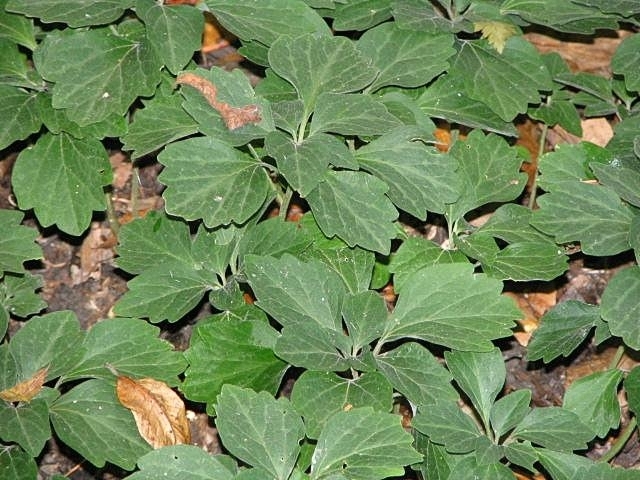Allegheny Spurge
(Pachysandra procumbens)
Allegheny Spurge (Pachysandra procumbens)
/
/

Photo by David J. Stang
CC BY-SA 4.0
Image By:
Photo by David J. Stang
Recorded By:
Copyright:
CC BY-SA 4.0
Copyright Notice:
Photo by: Photo by David J. Stang | License Type: CC BY-SA 4.0 | License URL: https://creativecommons.org/licenses/by-sa/4.0 | Uploader: David Stang | Publisher: Wikimedia Commons | Title: Pachysandra_procumbens_6zz.jpg | Notes: User created page with UploadWizard |























































Estimated Native Range
Summary
Pachysandra procumbens, commonly known as Allegheny Spurge, is a semi-evergreen to deciduous perennial subshrub or herb, native to the understory of deciduous forests in the Southeastern USA. It thrives in rich, moist, well-drained soils typical of forest floors from North Carolina and Kentucky south to Florida and Texas. This ground cover reaches 8-12 inches in height and can spread indefinitely by rhizomes, forming a dense carpet of matte blue-green leaves that are mottled with purple and white. The leaves are ovate to suborbicular, up to 3 inches long, coarsely toothed at the apex, and untoothed at the base. In USDA Zones 5 and 6, the leaves are typically deciduous, but in Zones 7 to 9, they are semi-evergreen to evergreen. However, even in milder climates, the foliage may appear worn by mid-winter. Tiny, fragrant, greenish-white to white flowers bloom in terminal spikes (2-4 inches long) in early spring, before the new leaves emerge.
Allegheny Spurge is valued for its low maintenance, resistance to deer and drought, and its ability to thrive in shaded conditions where other plants may struggle. It is commonly used as a ground cover in shaded gardens, under trees, or in border plantings. It performs well in a variety of soils, from moist to dry, and across a range of soil pH, as long as it is planted in partial to full shade. While it is generally a robust plant, it can suffer from leaf blight and stem rot in overly wet conditions.CC BY-SA 4.0
Allegheny Spurge is valued for its low maintenance, resistance to deer and drought, and its ability to thrive in shaded conditions where other plants may struggle. It is commonly used as a ground cover in shaded gardens, under trees, or in border plantings. It performs well in a variety of soils, from moist to dry, and across a range of soil pH, as long as it is planted in partial to full shade. While it is generally a robust plant, it can suffer from leaf blight and stem rot in overly wet conditions.CC BY-SA 4.0
Plant Description
- Plant Type: Subshrub, Herb
- Height: 0.5-1 feet
- Width: 1-2 feet
- Growth Rate: Slow
- Flower Color: White
- Flowering Season: Spring
- Leaf Retention: Evergreen
Growth Requirements
- Sun: Part Shade, Full Shade
- Water: Medium
- Drainage: Slow, Medium, Fast
Common Uses
Bank Stabilization, Bee Garden, Border Plant, Deer Resistant, Drought Tolerant, Fragrant, Groundcover, Low Maintenance, Street Planting
Natural Habitat
Understory of deciduous forests in the Southeastern USA
Other Names
Common Names: Mountain Spurge, Allegheny Pachysandra, American Thick-Stamen, Amerikanischer Ysander, Doftskuggröna
Scientific Names: , Pachysandra procumbens, Pachysandra erecta,
GBIF Accepted Name: Pachysandra procumbens Michx.